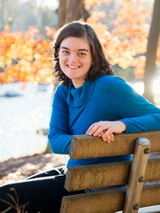Pulmonary Hypertension: Sara’s Story
Pulmonary Hypertension: Sara’s Story
Sara, 17, is heading off to college, where she plans to earn a degree that will prepare her for working with children. Her dream job is to work as a child life specialist, like the ones who worked with her at Children’s Hospital of Philadelphia, where she is treated for two heart conditions.

Sara’s parents, Kate and David, discovered their daughter had a health problem when she was 6 years old.
On a cool fall day, Kate met Sara at the bus stop after school and walked up the hill with her to get home. Kate hadn’t put on a jacket, and wanted to get in out of the cold, so she was trying to rush her daughter up the slope. Sara said she was tired and was lagging behind. When Kate looked back, she saw her daughter lying face down on the sidewalk.
It was a frightening experience. Sara seemed fine once she got indoors and caught her breath, but something was clearly wrong. This began a long journey of appointments with medical specialists.
Pediatric pulmonary hypertension
One of the last specialists Sara saw was a cardiologist. When he reviewed the results of an echocardiogram, he diagnosed Sara with pulmonary hypertension, a condition in which the pressure in vessels running from the heart to the lungs is too high, causing extra strain on the heart.
The cardiologist referred Sara to the Pulmonary Hypertension Program at Children’s Hospital of Philadelphia (CHOP). Brian Hanna, MDCM, PhD, FAAP, FACC, a cardiologist and Director of the program, called the family at home that night. He spoke with both of Sara’s parents, and impressed them by talking directly to Sara, too.
More About Pulmonary Hypertension
The family made an appointment to bring Sara to CHOP for an examination and a diagnostic procedure called a cardiac catheterization. This would allow her medical team to accurately measure the pressures in the lung vessels, to determine how well her heart is pumping, and to measure how much blood is flowing to the lungs and to the rest of the body.
Based on their evaluation, physicians recommended that Sara begin taking oral medication to reduce the pressure between her heart and lungs. The treatment helped alleviate her symptoms, and although she didn’t have the endurance for intense physical activity, she was able to keep up with her friends at school. Her condition remained under control for several years.
Coming back to CHOP
When Sara was 11, a new problem emerged — she started having seizures, and was diagnosed with epilepsy. She was put on medications to control the seizures, but they became more frequent over time. When the seizures started occurring daily, Sara was admitted to her local hospital in Harrisburg for observation, but doctors were perplexed, as the problem persisted.
The doctors with the Pulmonary Hypertension Program were receiving updates on Sara’s condition and recommended that she come back to CHOP. They discovered that Sara’s epilepsy diagnosis was incorrect. She actually had an arrhythmia called ectopic atrial tachycardia, a form of supraventricular tachycardia (SVT), which causes irregular heartbeats.
Sara was put on medication to stabilize her heart rhythm and was weaned off the medications she had been taking for epilepsy. “It was a miracle,” says Kate. “She hasn’t had an episode since.”
Big plans for the future

Over the years, Sara has continued her care with the Pulmonary Hypertension Program. Her medications for pulmonary hypertension have been changed a few times, but she has never needed intravenous (IV) medications. She used an inhaled version of Remodulin® for several years, and participated in a study for an oral form, which she now takes.
Now 17, Sara enjoys reading and writing. She loves working with children, and plans to study psychology in college. One of her goals is to work as a child life specialist, like the ones at CHOP who worked with her when she was younger. The Child Life team helps patients and families manage stress and learn positive coping skills.
Sara’s parents appreciate the expert care she has received over the years at CHOP. “The medical team there is wonderful,” Kate says.
“The doctors, the nursing staff, the technicians we have worked with for EKGs and echocardiograms — all of them are fantastic. Very patient and very kind.”